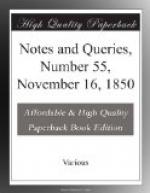A.W.H.
“Dat veniam corvis,” &c.—There were two headmasters of the school of Merchant Taylors, of the respective names of Du Guard and Stevens: the former having printed Salmasius’ Defensio Regia, was ejected by Lord President Bradshaw; and the latter held the vacant post in the interim, from February to September, 1650. He wrote during his tenure of office in the School Probation Book.”— {406}
“Res DEUS nostras celeri
citatas
Turbine versat.”
“Dat veniam corvis, vexat censura
columbas,
Pejus merenti melior, et pejor
bono.”
On his restoration Du Gard pleasantly retorted,—
“Du Gardum sequitur Stephanus, Stephanumque
vicissim,
Du Gardus: sortes versat utrinque
DEUS.”
M.W.
* * * * *
QUERIES.
DRYDEN’S “ABSALOM AND ACHITOPHEL.”
In my small library I have neither Malone’s Life of Dryden, nor that of more recent date by Sir Walter Scott; and, possibly, either of those works would render my present Query needless. It relates to a copy of Absalom and Achitophel now lying before me, which is a mere chap-book, printed on bad paper, in the most economical manner, and obviously intended to be sold at a very reasonable rate: indeed, at the bottom of the title-page, which is dated “1708,” we are told that it was “Printed and sold by H. Hills, in Black-fryars, near the Water-side, for the Benefit of the Poor.” It consists of twenty-four pages, small 8vo., and, in order that the poem should not occupy too much space, one of the pages (p. 22.) is in a smaller type, and in double columns. At the end is the following singular
“ADVERTISEMENT.
“To prevent the publicks being impos’d on, this is to give notice that the book lately published in 4to. is very imperfect and uncorrect, in so much that above thirty lines are omitted in several places, and many gross errors committed, which pervert the sense.”
The above is in Italic type, and the body of the tract consists of only the first part of Absalom and Achitophel, as ordinarily printed: allowing for misprints (which are tolerably numerous), the poem stands very much the same as in several common editions I have at hand. My Query is, Is the work known to have been so published “for the benefit of the poor,” and in order to give it greater circulation, and what is the explanation of the “Advertisement?”




